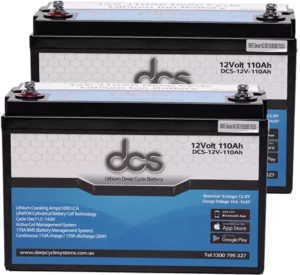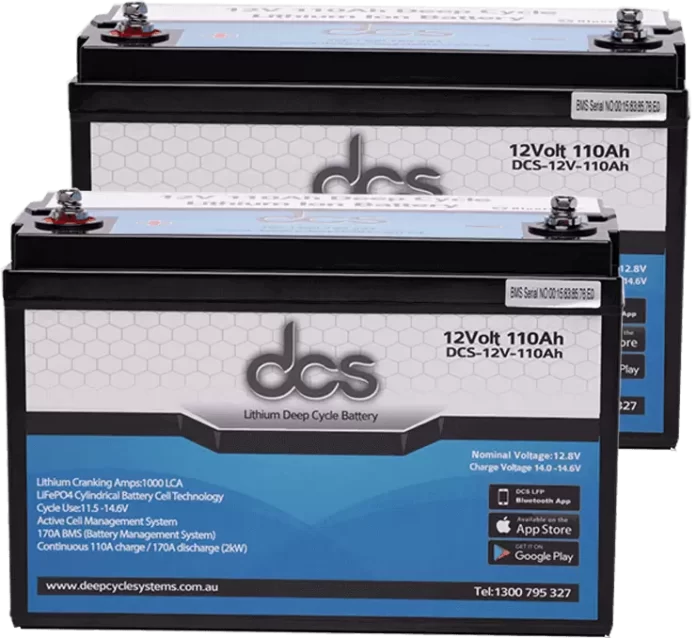Are you looking to upgrade your vehicle’s battery system for better performance and reliability? Look no further than the lithium battery for dual battery system. With its advanced technology and superior features, this battery is becoming increasingly popular among car enthusiasts and off-road adventurers. In this guide, we will explore the benefits and considerations of using a lithium-ion battery for a dual-battery system and provide tips on installation and maintenance. So, buckle up and get ready to power up your vehicle with this innovative battery solution.
Understanding the Lithium-ion Battery
Lithium-ion batteries have taken the world by storm with their incredible power and efficiency. These batteries work on the principle of lithium ions moving back and forth between the positive and negative electrodes during charge and discharge. This process allows them to store and release energy quickly, making them ideal for dual battery systems. One of the main advantages of lithium-ion batteries is their high energy density. This means they can store a large amount of energy in a compact size, making them perfect for vehicles with limited space.
They have a low self-discharge rate, meaning they can hold their charge for longer periods without recharging. Another key benefit of lithium-ion batteries is their long lifespan. They can withstand hundreds of charge-discharge cycles, ensuring they last for many years. This durability makes them a cost-effective choice in the long run. Lithium-ion batteries are lightweight compared to traditional lead-acid batteries. This improves the vehicle’s performance and reduces the overall weight, enhancing fuel efficiency.
Installation Considerations for Dual Battery Systems
Installing a dual-battery system with a lithium-ion battery requires careful consideration and planning. Here are some key factors to keep in mind:
Power requirements:
Determine your vehicle’s power needs before installation. Consider the accessories and equipment you will be running off the battery. This will help you determine the capacity and size of the lithium-ion battery required for your dual battery system.
Mounting location:
Choose a suitable location for the lithium-ion battery. Ensure it is secure and well-protected from vibrations and external elements. Consider factors such as heat dissipation and ventilation to prevent overheating.
Wiring and connections:
Proper wiring and connections are crucial for a reliable and efficient dual battery system. Use high-quality cables and connectors that can handle the current flow. Ensure proper isolation between the starter and auxiliary lithium-ion batteries to prevent voltage drop and interference.
Charging system compatibility:
Verify that your vehicle’s charging system is compatible with lithium-ion batteries. Some vehicles may require additional equipment, such as a DC-DC charger or a battery management system, to charge and maintain the lithium-ion battery properly.
Safety precautions:
Follow all safety guidelines and recommendations the manufacturer provides. This includes wearing protective gear and disconnecting the vehicle’s electrical system before installation.
Optimizing the Charging Process for dual battery system lithium
To ensure optimal performance and longevity of your dual battery system lithium, it is crucial to optimize the charging process. Here are some tips to help you get the most out of your battery:
- Use a compatible charger: Invest in a charger specifically designed for lithium-ion batteries. These chargers are designed to provide the correct voltage and charging algorithm, maximizing the battery’s lifespan.
- Avoid overcharging: Lithium-ion batteries should not be left on the charger for extended periods after reaching full charge. Overcharging can damage the battery and reduce its overall capacity. Unplug the charger once the battery is fully charged.
- Charge at the right temperature: Lithium-ion batteries charge most efficiently at room temperature. Avoid charging in extreme hot or cold temperatures, which can affect the battery’s performance and lifespan.
- Regularly balance the cells: Lithium-ion batteries consist of multiple cells, and it’s essential to keep these cells balanced to maintain overall battery health. Some chargers have a balancing feature that equalizes the charge across all cells.
- Monitor charging voltage and current: Keep an eye on the charging voltage and current to ensure they are within the recommended limits. Excessive voltage or current can lead to overheating and damage to the battery.
Why Use Lithium-Ion Batteries in Dual Battery Systems?
Lithium-ion batteries offer many advantages that make them the perfect choice for dual battery systems. These batteries have a higher energy density than traditional lead-acid batteries. This means you can store more energy in a smaller and lighter package, giving you more power without sacrificing valuable space in your vehicle. Lithium-ion batteries have a longer lifespan, allowing them to withstand hundreds of charge-discharge cycles. This durability makes them a cost-effective choice in the long run, as they won’t need to be replaced as frequently as lead-acid batteries.
Lithium-ion batteries have a low self-discharge rate, meaning they can hold their charge for longer periods without recharging. This is especially useful for off-road adventurers relying on their batteries for extended periods. Lithium-ion batteries are lightweight, improving your vehicle’s performance and enhancing fuel efficiency. With their advanced technology and superior features, lithium-ion batteries provide the power, reliability, and longevity that every car enthusiast and off-road adventurer desires. So, if you want to upgrade your dual battery system, the Switch to a lithium-ion battery is worth it. You will be satisfied with these batteries’ superior performance and efficiency.
 Maintaining Lithium-Ion Batteries for Optimal Performance
Maintaining Lithium-Ion Batteries for Optimal Performance
Once you have installed a dual battery system with a lithium-ion battery, it’s essential to maintain it properly to ensure optimal performance and longevity. Here are some tips for maintaining your lithium-ion battery:
Regularly monitor the charge level:
Keep an eye on the battery’s charge level to prevent it from dropping too low. Lithium-ion batteries perform best when kept at around 50% to 80% charge. Avoid fully discharging or overcharging the battery.
Store the battery correctly:
If you are not using your vehicle for an extended period, it’s important to store the lithium-ion battery properly. Please keep it in a cool, dry place, away from direct sunlight. Before storage, ensure the battery is adequately charged, typically around 50% to 80%.
Clean the battery terminals:
Periodically check the battery terminals for any corrosion or buildup. If you notice any, clean the terminals using a battery terminal cleaner or a mixture of baking soda and water. This will help maintain a good connection and prevent any voltage drops.
Protect the battery from extreme temperatures:
Lithium-ion batteries perform best at room temperature. Avoid exposing the battery to extreme heat or cold, affecting its performance and lifespan. Use insulating materials or a battery blanket to regulate the temperature if necessary.
Follow the manufacturer’s guidelines:
Always refer to the manufacturer’s guidelines for specific maintenance recommendations for your lithium-ion battery. They will provide detailed instructions on how to ensure optimal performance and longevity.
Is the to lithium dual battery systems Worth It?
When considering upgrading to a lithium dual battery systems, you might wonder if it’s worth it. The answer is a resounding yes! Making the Switch to lithium-ion batteries offers a wide range of benefits that make it a worthwhile investment. Lithium-ion batteries have a higher energy density compared to traditional lead-acid batteries. This means you can store more energy in a smaller, lighter package, giving you more power without sacrificing valuable space in your vehicle. Lithium-ion batteries have a longer lifespan, allowing them to withstand hundreds of charge-discharge cycles.
This longevity makes them a cost-effective choice in the long run, as they won’t need to be replaced as frequently as lead-acid batteries. Lithium-ion batteries have a low self-discharge rate, meaning they can hold their charge for longer periods without recharging. This is especially useful for off-road adventurers relying on their batteries for extended periods. Lithium-ion batteries are lightweight, improving your vehicle’s performance and enhancing fuel efficiency. So, if you’re looking for better power, reliability, and longevity, the Switch to a lithium dual-battery system is worth it. You will be satisfied with the superior performance and efficiency of lithium-ion batteries.
Common Myths about Lithium-Ion Battery
As with any technology, there are bound to be myths and misconceptions surrounding lithium-ion batteries. Let’s debunk some common myths and set the record straight:
Myth: Lithium-ion batteries are prone to explode.
Fact: While it is true that mishandling lithium-ion batteries can lead to safety hazards, such as overheating and thermal runaway, properly manufactured and used lithium-ion batteries have built-in safety features that minimize these risks. As long as you follow proper handling and charging procedures, the likelihood of an explosion is extremely low.
Myth: Lithium-ion batteries degrade quickly over time.
Fact: Lithium-ion batteries degrade over time, but proper care and maintenance can significantly extend their lifespan. With regular monitoring, charging at the recommended voltage, and avoiding extreme temperatures, you can ensure your lithium-ion battery lasts for many years.
Myth: Lithium-ion batteries cannot be recycled.
Contrary to popular belief, lithium-ion batteries can and should be recycled. Many recycling programs exist to dispose of lithium-ion batteries properly, ensuring valuable materials’ recovery and reducing environmental impact.
Myth: Lithium-ion batteries are expensive.
Fact: Lithium-ion batteries may have a higher upfront cost than traditional lead-acid batteries, but they offer greater longevity and performance. In the long run, this makes them a cost-effective choice, especially considering their lower maintenance requirements.
FAQs
Q: How long does lithium battery for dual battery system typically last?
A: The lifespan of a lithium-ion battery can vary depending on various factors such as usage, maintenance, and charging habits. However, you can expect a lithium-ion battery to last several years with proper care and maintenance.
Q: Do I need a special charger for my lithium-ion battery?
A: Yes, it is recommended to use a charger specifically designed for lithium-ion batteries. These chargers are designed to provide the correct voltage and charging algorithm, ensuring optimal performance and longevity of the battery.
Q: Can I install a lithium-ion battery in any vehicle?
A: Yes, as long as the battery meets the power requirements of your vehicle and the necessary installation considerations are taken into account, a lithium-ion battery can be installed in various types of vehicles.
Q: Are lithium-ion batteries safe to use in a dual-battery system?
A: Lithium-ion batteries are safe to use in a dual battery system when handled and used correctly. It is important to follow proper safety guidelines, including wearing protective gear and following manufacturer recommendations.
Conclusion
Using a lithium-ion battery for a dual battery system offers numerous benefits for car enthusiasts and off-road adventurers. Lithium-ion batteries’ advanced technology and superior features provide better performance, reliability, and longevity than traditional lead-acid batteries. By understanding the lithium-ion battery, considering installation factors, optimizing the charging process, and maintaining it properly, you can maximize its potential and enjoy its benefits for years. So, don’t hesitate to switch to a lithium-ion battery and power up your vehicle with this innovative solution.


